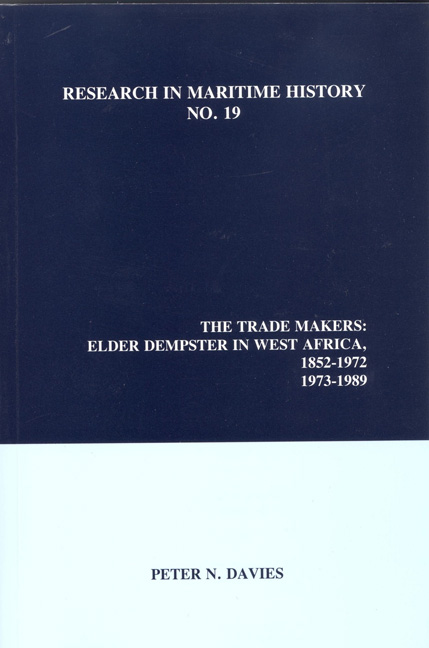Book contents
- Frontmatter
- Table of Contents
- List of Illustrations
- Foreword
- Introduction (Second Edition)
- Foreword
- Preface
- Acknowledgments
- Introduction to the Original Edition
- Frontispiece
- Part One The Pioneers
- Part Two Elder Dempster And Company
- Part Three Elder Dempster And Company Limited
- Part Four Elder Demster Lines Limited
- Part Five The End Of An Era
- List of Appendices
- Appendices
- Bibliography
- Index
Preface
- Frontmatter
- Table of Contents
- List of Illustrations
- Foreword
- Introduction (Second Edition)
- Foreword
- Preface
- Acknowledgments
- Introduction to the Original Edition
- Frontispiece
- Part One The Pioneers
- Part Two Elder Dempster And Company
- Part Three Elder Dempster And Company Limited
- Part Four Elder Demster Lines Limited
- Part Five The End Of An Era
- List of Appendices
- Appendices
- Bibliography
- Index
Summary
The author is well aware of the many imperfections of this work in spite of the long period spent in research and composition. One major difficulty has been that few records cover such a long time-span in a single format. Consequently, it is not claimed that the sources which have been consulted were in any sense complete or comprehensive. In practice, therefore, many short series, or fragments, have had to be used - not because they were considered ideal but because, in many cases, they alone were available. With advantage, several additional years could have been spent on the interpretation of the source material, but the paucity of existing works has convinced him that publication must not be further delayed. This view has been strongly confirmed by the demands for information both by scholars and by members of the public. As a result, this study is offered in its present form with the thought that it may provide a basis for the criticism and further researches of other academics. This, of course, is the true path to a fuller understanding in this field as in all others.
Any academic study which attempts to deal with the history or economic development of a business or industry is necessarily heavily dependent upon the willing co-operation of members of the trade. In this examination of Elder Dempster Lines and its predecessors, in the period from 1852 to the present day, I have been extremely fortunate in securing the help of many men who have spent the whole of their working lives in the shipping, finance or trade of the Coast. In effect, therefore, this work has been in the nature of a joint effort between a member of the Department of Economic History in the University of Liverpool and many of the senior executives of the principal companies engaged in the shipping and commerce of West Africa.
I am especially indebted to the late Sir Alan Tod, formerly a senior partner in Baring Brothers, a former chairman of Elder Dempster Lines Holdings Limited (now Liner Holdings Limited), and a past director of Elder Dempster Lines Limited. He granted me the rare privilege of several stimulating interviews at which he discussed the theoretical as well as the practical problems posed by the collapse of the Royal Mail group.
- Type
- Chapter
- Information
- The Trade MakersElder Dempster in West Africa, pp. xx - xxivPublisher: Liverpool University PressPrint publication year: 2000

